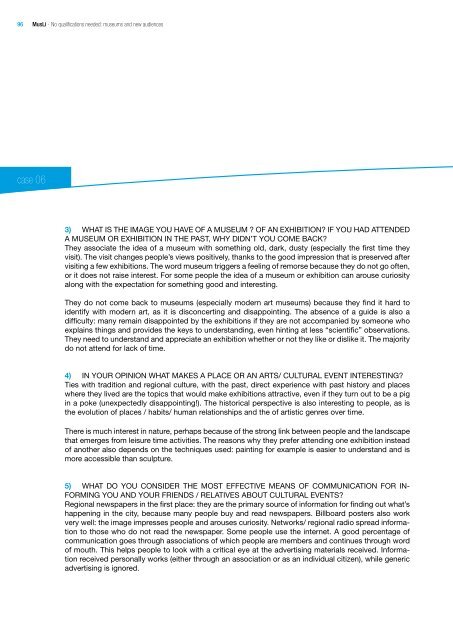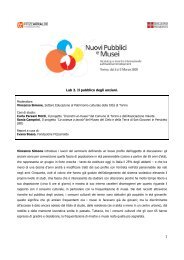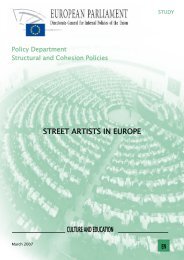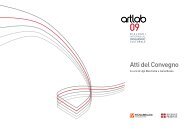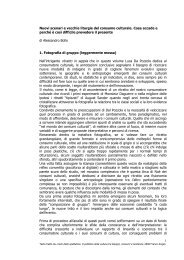MusLi (Museums Literacy) - Fondazione Fitzcarraldo
MusLi (Museums Literacy) - Fondazione Fitzcarraldo
MusLi (Museums Literacy) - Fondazione Fitzcarraldo
Create successful ePaper yourself
Turn your PDF publications into a flip-book with our unique Google optimized e-Paper software.
96 <strong>MusLi</strong> - No qualifications needed: museums and new audiences<br />
case 06<br />
3) WHAT IS THE IMAGE YOU HAVE OF A MUSEUM ? OF AN EXHIBITION? IF YOU HAD ATTENDED<br />
A MUSEUM OR EXHIBITION IN THE PAST, WHY DIDN’T YOU COME BACK?<br />
They associate the idea of a museum with something old, dark, dusty (especially the first time they<br />
visit). The visit changes people’s views positively, thanks to the good impression that is preserved after<br />
visiting a few exhibitions. The word museum triggers a feeling of remorse because they do not go often,<br />
or it does not raise interest. For some people the idea of a museum or exhibition can arouse curiosity<br />
along with the expectation for something good and interesting.<br />
They do not come back to museums (especially modern art museums) because they find it hard to<br />
identify with modern art, as it is disconcerting and disappointing. The absence of a guide is also a<br />
difficulty: many remain disappointed by the exhibitions if they are not accompanied by someone who<br />
explains things and provides the keys to understanding, even hinting at less “scientific” observations.<br />
They need to understand and appreciate an exhibition whether or not they like or dislike it. The majority<br />
do not attend for lack of time.<br />
4) IN YOUR OPINION WHAT MAKES A PLACE OR AN ARTS/ CULTURAL EVENT INTERESTING?<br />
Ties with tradition and regional culture, with the past, direct experience with past history and places<br />
where they lived are the topics that would make exhibitions attractive, even if they turn out to be a pig<br />
in a poke (unexpectedly disappointing!). The historical perspective is also interesting to people, as is<br />
the evolution of places / habits/ human relationships and the of artistic genres over time.<br />
There is much interest in nature, perhaps because of the strong link between people and the landscape<br />
that emerges from leisure time activities. The reasons why they prefer attending one exhibition instead<br />
of another also depends on the techniques used: painting for example is easier to understand and is<br />
more accessible than sculpture.<br />
5) WHAT DO YOU CONSIDER THE MOST EFFECTIVE MEANS OF COMMUNICATION FOR IN-<br />
FORMING YOU AND YOUR FRIENDS / RELATIVES ABOUT CULTURAL EVENTS?<br />
Regional newspapers in the first place: they are the primary source of information for finding out what’s<br />
happening in the city, because many people buy and read newspapers. Billboard posters also work<br />
very well: the image impresses people and arouses curiosity. Networks/ regional radio spread information<br />
to those who do not read the newspaper. Some people use the internet. A good percentage of<br />
communication goes through associations of which people are members and continues through word<br />
of mouth. This helps people to look with a critical eye at the advertising materials received. Information<br />
received personally works (either through an association or as an individual citizen), while generic<br />
advertising is ignored.


